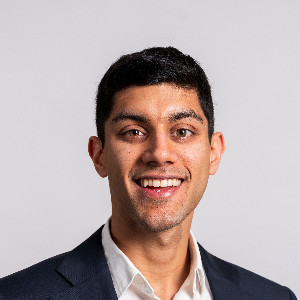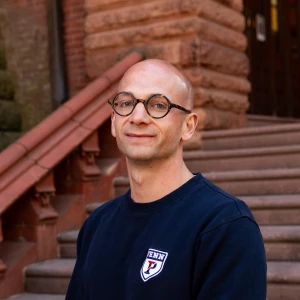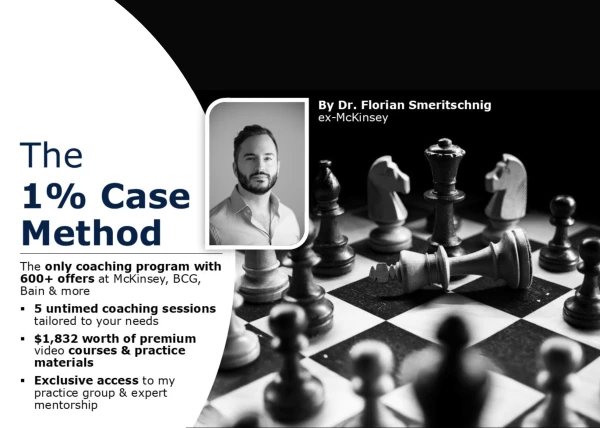Hello,
I was wondering how the interviewers are actually trained to conduct interviews. Definitely, one has to have a certain level of seniority within the firm, and also, some training is provided, but that's all I actually know. I have three topics to ask about:
1. How are consultants selected to start their training for becoming an interviewer? Are all consultants encouraged to start this process on their own or is it the firm that makes it compulsory? Are there any criteria that are applied to consultants-interviewers in terms of their personal characteristics? May being an impactful worker with significant achievements during the project become an “entry ticket”?
2. How does this training look like? Is it a bunch of workshops or something more? And also, what is the content of these studies?
3. How does the first practical implication of theoretical knowledge look like? Are “beginners” conducting first round interviews right after the training or are they practicing somehow else? Is it true that unexperienced interviewers may sound too robotic and script-based during their first attempts? (If you are willing to share your first experience as an interviewer I highly encourage you to do so!)
Thank you!
The Interviewer Cuisine


Hi there,
In the German office of McK it works roughly the following way:
- Given a high enough performance rating, you can actually become an interviewer already after your first year as a Fellow (Business Analyst in other offices), which I believe is a bit earlier compared to other countries. HR reaches out to you if you are interested in the task (which takes quite some additional effort next to your consulting day job…).
- You learn to interview (case and PEI) in a workshop that includes everything related to content and evaluation. You also create, finetune, and practice your first case during this session (based on the interviewing guidelines) with professional interview coaches. Before you run your first case, you also sit with current interviewers as a third person to monitor how your colleagues are doing it.
- After training and monitoring, you run your first interviews, periodically with an interview coach present, who calibrates your interviewing style and evaluation along the way.
As a result, McKinsey interviewers usually go well prepared into their first interview. The format is highly standardized and much more objective than for other consulting firms due to the very narrow case creation, interviewing and evaluation guidelines, which are also standardized on a global scale.
I cannot speak for other consulting firms but having interviewed with most of them (MBB, tier-2, and some boutiques) two times (internships and full-time roles later on) I noticed significant differences in the quality and variety across firms and interviews. Some examples:
- For instance, during my first Kearney interview, the junior interviewer was reading the case from a piece of paper and constantly compared my answers to his notes. He appeared super nervous.
- During a Strategy& interview, the interviewer was using one of the cases from a famous casebook. I remembered it and solved it very quickly, so got another case right afterwards…
- During an OC&C interview, the interviewer asked me to create my own case and then solve it. Very creative and engaging, yet not very standardized and not suited for an objective evaluation across candidates.
Cheers,
Florian

Hi there,
My question to you is, if you're preparing for interviews, is this really going to help you? You need to focus your energy/efforts on what matters: your case performance.
If you're already planning to enter a firm (offer accepted), why not just wait to see exactly what they have to say?
I respect your curiosity, but please try to focus on what matters here.
1. As you reach a certain level you are expected to contribute to the firm. One of these ways is through interviews. You can start interviewing after a number of established years at the company, and, generally once you become a 2nd year consultant and, especially project lead
2. There is training. But I'd prefer not to disclose exactly what happens. That said, part of it is generally creating your own case(s) (based on a past project) that is thoroughly reviewed/vetted.
3. You normally observe and “sit-in” with a trained interviewer first.

Depending on the size of the firm, conducting interviews can be either a prestige or a mere necessity. Sooner or later all consultants should be involved in the recruiting efforts of their company. Typical characteristics for interviewers are:
- Minimum level of seniority
- Minimum tenure with the firm so they can actually talk about culture, etc.
- Completed interviewer training
This, by the way, is a type of question I would not recommend to ask your interviewer in your last 5 minutes of the interview. It is not relevant for the context of your own interview so good thing you ask it here to satisfy your curiosity ;)

It will vary by company - and even within companies by office. Christian has given a great answer on how it works in general in McKinsey - but there can be some nuances. In North America, for example, BAs are allow to interview for the BA role in the first round if they have been with the firm for more than two years. In general though, consulting firms rely on their people to run a successful business and so they care a lot about the strength of their recruiting and will invest heavily in making sure the interviewers are well trained!

Hi there,
I understand your curiosity, so let me give you a brief overview of how it works inside McKinsey.
Once you reach Associate (so the role before Engagement Manager but after Business Analyst in most offices), you are allowed to go through interviewer training. Becoming an interviewer is something that is heavily encouraged and is a good credential to have for your evaluation, because it shows you are willing to contribute to the office. In fact, most offices struggle because they don't have enough interviewers, so volunteering to go through the training and dedicate your time for it is heavily encouraged.
Once you volunteer, you go through a half a day training. The training explains the criteria for assessing candidates, as well as the conduct that you as the interviewer should adopt. After this training, most offices require the new interviewers to shadow more senior ones for a couple of interviews to see how it plays out in practice.
After that, you're qualified to conduct interviews and you'll be regularly liaising with HR to schedule as many interviews as you can handle on an almost weekly basis.
Hope this helps shed some light on the process!
Best of luck with it!
Cristian

To your last question, it is reasonable to expect a first-time interviewer would be slightly less prepared than a seasoned one. However, the differences here pale in comparison with the general differences between interviewers and what sticks out to them - every one has a slightly different approach in how they want things to flow, so I would not focus too much on this. It is also unlikely that you will catch more than 1 person at most who is an early stage interviewer, and this should not impact your preparation or approach at all














